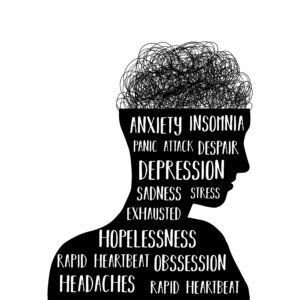21 May Part 2: Breaking Down the Walls of MH
Mental Health Resources and Advice from Debra Patterson, clinical psychologist at Children’s of Alabama and Cindy Jones, Director of Psychiatric Intake Response Center at Children’s of Alabama.

Q: How do you notice the signs of someone you know or love struggling with mental health?
A: Sometimes it’s difficult to determine if someone is having a bad day or week, or if there is something more serious developing. Children and teens’ mental health is an important part of their overall development. Generally, you might notice persistent changes in a loved one’s behavior and/or mental state that indicate help may be needed. Help may be found by scheduling an appointment with a licensed mental health professional for therapy and/or a psychiatrist for medication management.
Symptoms to look for:
- Withdrawn and/or isolated from family and friends
- Refusal to leave home or go to school or not wanting to be at home
- Unable or refusal to talk about situations or feelings
- Appetite changes
- Poor sleep
- Emotional dysregulation
- Difficulty tolerating frustrating situations
- Self-harm such as cutting or burning
- Regressive behavior such as, being clingy
- Lack of motivation or participation in interests and hobbies
Some symptoms indicate a child is in imminent danger and without help, this may be life-threatening. This is considered a psychiatric emergency.
Seek immediate attention by going to an Emergency Department or calling 911 when:
- Two or more of the symptoms listed above persist for two weeks or more (pattern)
- Threatening to harm or thinking about harming a person, a group, or self
- Taking steps to commit suicide such as getting a weapon, collecting pills, or writing a note about not wanting to live or about dying
- Angry, aggressive behavior toward others increases
- Harming animals
- Hearing or seeing things that are not present
- Overly fearful, anxious, or upset about others (paranoid)
- Losing touch with reality
- Severely depressed or anxious mood
- Significant changes occur with appetite, hygiene, sleep, mood

Q: If a child is showing signs of mental health struggles, but refuses to talk about it, how do you approach the situation in hopes to effectively help them without pushing them away further, or without sending them off the deep end?
A: First, it is important to remember that talking about behavioral or emotional challenges, including suicidal thoughts, does not make those problems worse. Approach the situation in a non-judgmental manner and avoid using labels. Be open and empathetic. Focus on something specific you have noticed that concerns you and use an open-ended question.
For example, instead of approaching a teenager by saying, “Are you depressed?”, you might say, “I’ve noticed that you don’t seem to be spending time with your friends and are sleeping a lot lately. What’s up?”
Then, don’t stop observing and trying to open the conversation. Many times, it takes several approaches for someone to become comfortable and truly trust that you are interested in what’s going on. It is instinct, especially for parents, to begin to solve the problem. Instead, listen and support your loved one so that you can work together on the problem in a way that makes the most sense to them. Also, if someone you care about is struggling, it’s unlikely that you are the only one to notice. Try to enlist others to talk with them while keeping shared information private. Teenagers are especially sensitive when their personal information is shared with others, even with the best intentions.
Generally, it’s important to create home and social environments in which disappointment, failure, sadness, anger and frustration are openly discussed by everyone. That way, there’s less of a chance that a person will work to hide those feelings and they will also be better equipped to manage them when they naturally arise.

Q: What do you do when you know your loved one is struggling with mental health, but they are refusing treatment or help? Furthermore, how do you get them to open up and receive help as best you can?
A: First, offer as many options as possible since you never know what may be the best fit for them or what may make treatment inaccessible for them. Often, people do not know what to expect and are anxious about talking to a mental health provider. Movies and TV shows do not always depict those relationships in the best light! Offering information, even your own experience in therapy, may be helpful.
Make sure that children and teens know there are no needles or shots involved, and knowing what to expect during the visit can shift their attitude just enough. For teenagers, highlighting the confidential relationship between them and their therapist, counselor, psychologist or psychiatrist can help that professional be seen as a welcome ally, not just another adult telling them what to do! Be honest with how their struggle is affecting your relationship together. Remember that it is impossible to argue, shame, bribe or otherwise pressure anyone into asking for and receiving help.
Validate their experiences, even when they don’t appear to align with your observations. For example, if the child shares, “nobody likes me and I’m just stupid,” replying with “that’s not true. You make good grades and were invited to Lexi’s birthday party,” does not address her worries, concerns, or fears. Lastly, the resources provided here will supply you with a wealth of information and options for both you and your loved one as you work through the concerns together. Always, any concerns about immediate safety should be taken seriously and evaluated by a behavioral health professional at the nearest emergency department.

Q: What are some resources you can provide your loved one with to get them the help they need?
A: The best resource for adults to access for children and teens is the Psychiatric Intake Response Center (PIRC) at Children’s of Alabama. It is a free, confidential phone response center linking adult callers and community providers to the most appropriate mental health resources for kids. The phone number is 205-638-7472 (PIRC). The resource line is open from 8 am-11 pm every day. Other resources that may be helpful are:
- Crisis Hotlines:
- National Suicide Prevention Lifeline: Call or text 988 or 1-800-273-8255 (English) or 1-888-628-9454 (Spanish).
- National Human Trafficking Hotline: Call 1-888-373-7888.
- National Runaway Safe line: Call 1-800-RUNAWAY.
- SAMHSA National Helpline: 1-800-662-4357 (HELP) or TTY: 1-800-487-4889. Treatment referral line.
- The Trevor Lifeline: 1-866-488-7386 or text START to 678-378. Crisis intervention services for LGBTQ+ youth.
- Teen Line: Call 1-800-852-8336 from 8 pm-12 am or text TEEN to 839-863 from 8-11 pm.
- Text Lines:
- TXT 4 HELP: Text SAFE and your current location (address, city, state) to 4HELP (44357) for immediate help. A 24-hour text-for-support service for teens in crisis.
- National Human Trafficking: SMS: 233733 and text “HELP” or “INFO” 24 hours
- Other Resources:
- Psychiatric Intake Response Center (PIRC): Call 205-638-7472, 8 am-11 pm, every day, mental health resource line
- Recovery Resource Center: Call 205-458-3377; M-F 8:30 am-5 pm, substance use resource line.
- Stopbullying.gov, how you can prevent and respond to bullying websites.
- Wings Across Alabama: 1-844-999-4647; M-F 2-8 pm; Sat.-Sun. 3-8 pm. A non-crisis line to talk to peers about mental, emotional, and social challenges.
See the resource page on our website for more resources.

Takeaway:
It can be difficult to break through barriers that people put up to mask their pain and suffering. It is important to never give up. Sometimes, all these kids want is to not have someone give up on them. If we do, they may be led to think, “Well if they gave up on me, why shouldn’t I?” They want help, but sometimes it just takes patience, unconditional love, all-hands-on-deck support. Eventually, a breakthrough will happen. The time frame of that is not always the same. Some may be willing to open up early on in their struggle, others may take years. Either way, don’t give up. At the end of the day, you may be their only reason to hold on. You may end up being all they have at their worst moment. And that means everything.


Sorry, the comment form is closed at this time.